In celebration of UCLA’s first 100 years, we’re traveling back in time to visit some of the people, places and moments in time that have had a lasting impression on who we are as a university.
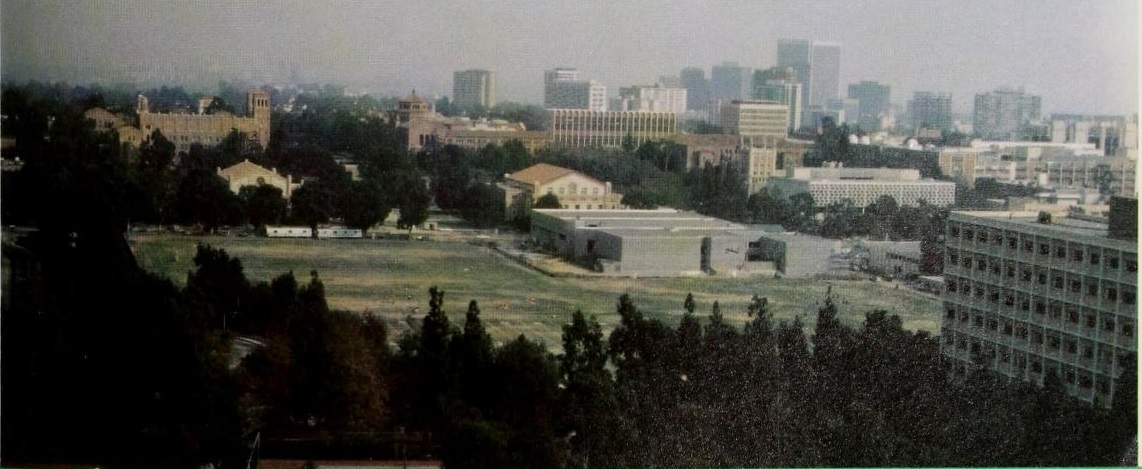

UCLA Campus 1983
UCLA was center stage for the big events of the 1980s as the world watched the Olympic gymnastics competition broadcasting from Pauley Pavilion; the Los Angeles Lakers, with Bruin Kareem Abdul-Jabbar in the starting line-up, took home five NBA championships; and UCLA became the first college to license its name as Bearwear became the top-selling college brand around the globe. By the Eighties, UCLA had been established as a leader in education with its faculty, programs and students ranked second in the nation among public universities and 17 academic departments ranked in the top 10 in the country by the Conference Board of Associated Research Councils.
CAMPUS HOSTS THE OLYMPICS
The summer of 1984 was a watershed moment, propelling the university onto the world stage. Los Angeles hosted the Games of the XXIII Olympiad, becoming the only city in the United States to host the summer games twice. UCLA legend and Olympic decathlete Rafer Johnson ’59 carried the torch into the LA Coliseum to light the Olympic flame.
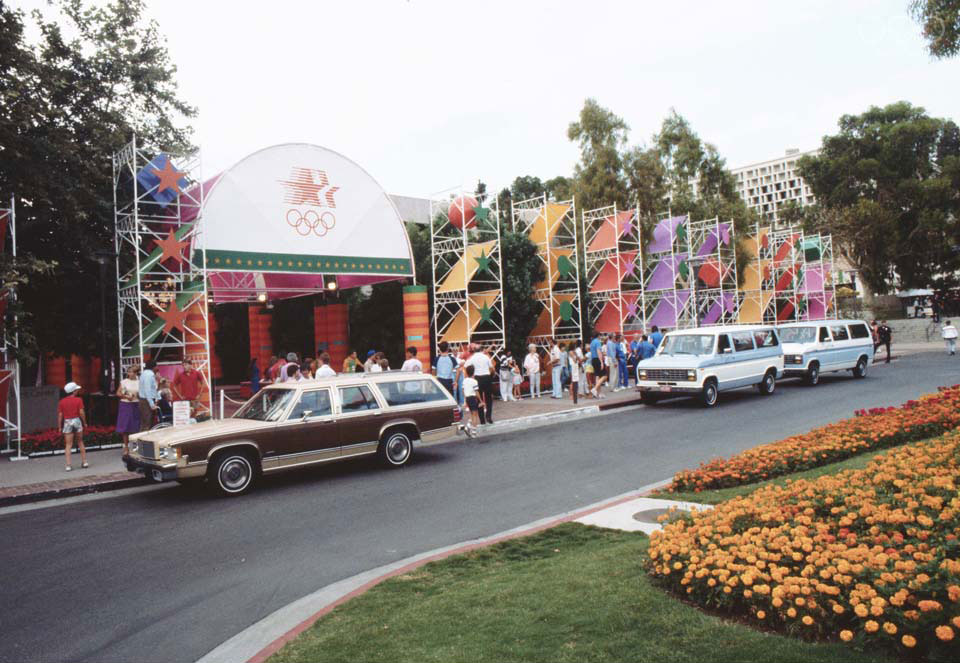 UCLA embraced a welcoming spirit as Bruins hosted athletes and visitors from around the world. Campus was transformed into an international Olympic Village, housing more than 4,000 athletes, coaches and trainers from 62 countries, with athletes training in campus athletic facilities. More than 160,000 spectators came to Pauley Pavilion to witness the gymnastics competitions while the Tennis Center, built for the games, held a demonstration tournament. The Alumni Association’s new home, the James West Alumni Center (JWAC), was headquarters for the Olympic Organizing Committee. JWAC became the official entryway to the Olympic Village — a main street overlooking the 142 Flags of Nations. James Easton ’59 served as mayor, greeting athletes and ensuring things went as planned. UCLA students made memories to last a lifetime as Olympic volunteers.
UCLA embraced a welcoming spirit as Bruins hosted athletes and visitors from around the world. Campus was transformed into an international Olympic Village, housing more than 4,000 athletes, coaches and trainers from 62 countries, with athletes training in campus athletic facilities. More than 160,000 spectators came to Pauley Pavilion to witness the gymnastics competitions while the Tennis Center, built for the games, held a demonstration tournament. The Alumni Association’s new home, the James West Alumni Center (JWAC), was headquarters for the Olympic Organizing Committee. JWAC became the official entryway to the Olympic Village — a main street overlooking the 142 Flags of Nations. James Easton ’59 served as mayor, greeting athletes and ensuring things went as planned. UCLA students made memories to last a lifetime as Olympic volunteers.
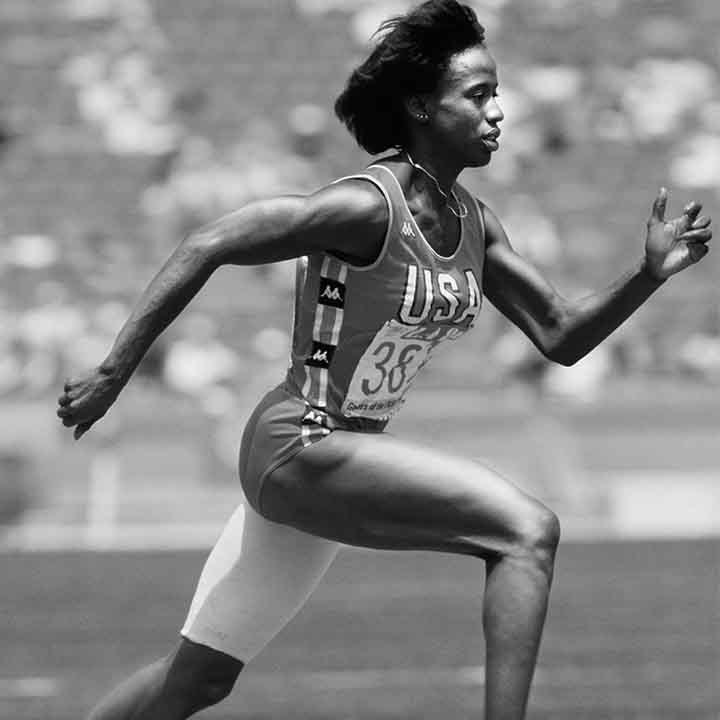 Sprinter Jackie Joyner-Kersee ’85 was a student when she won silver in the heptathlon. As a young athlete, she admired two of the first women to receive UCLA athletic scholarships, track’s Evelyn Ashford and basketball’s Nancy Meyers ’78. In her lifetime, Joyner-Kersee won three gold, one silver and two bronze Olympic medals and set records that still exist today. In 2001, she was named the Edward A. Dickson Alumnus of the Year by the Alumni Association.
Sprinter Jackie Joyner-Kersee ’85 was a student when she won silver in the heptathlon. As a young athlete, she admired two of the first women to receive UCLA athletic scholarships, track’s Evelyn Ashford and basketball’s Nancy Meyers ’78. In her lifetime, Joyner-Kersee won three gold, one silver and two bronze Olympic medals and set records that still exist today. In 2001, she was named the Edward A. Dickson Alumnus of the Year by the Alumni Association.

Olmypic Village Entrance
Along with being home for athletes and events, the behind-the-scenes work to produce and televise the Olympic experience also took place on campus. ABC television, which had the rights to air the games, used Spaulding Field; the press corps set up in Ackerman Student Union; and the Peter V. Ueberroth building on Le Conte housed the Los Angeles Olympic Committee.
UCLA was represented by 60 athletes and coaches, the largest number from any university, who won 37 medals: 17 gold, 14 silver and six bronze for the United States and 10 other countries. Three of the six members of the first gold-medal-winning U.S. Men’s Gymnastics team were Bruins: Peter Vidmar ’83, Mitch Gaylord and Tim Daggett ’86. Vidmar won gold on the pommel horse and Gaylord earned three additional medals, contributing to the team gold with his signature move, the Gaylord II.

Jackie Joyner Kersee '85
Florence Griffith Joyner ’83, known as FloJo, is called the fastest woman of all time with records in the 100- and 200- meter races that still stand. In 1984, she won silver in the 200-meter race, and has earned a total of five career Olympic medals. The Watts native put her Cal State Northridge education on hold to help her family, transferring to UCLA when her coach, Bob Kersee, joined UCLA’s staff.
Two Olympic champions who did not compete in the 1984 Olympics were enrolled at UCLA during the games — Gail Devers ’89 is an eight-time World Champion with three Olympic gold medals and Donna de Varona ’86 was the youngest competitor at the 1960 Olympics, with two Olympic golds and an unprecedented 18 world records. De Varona retired from swimming at 17 to become the youngest, and one of the first female sportscasters for a national network. An activist for youth sports, equality in sports and expanding opportunities for women, she received the Olympic Order, the International Olympic Committee’s highest honor.
Los Angeles Mayor Tom Bradley ’41, ran track at UCLA and recalls watching the 1932 Olympic races from outside the Los Angeles Coliseum. The city’s first African American mayor, Bradley had the vision and leadership to bring the games to Los Angeles. The Tom Bradley Terminal at LAX opened in conjunction with the Olympic Games and UCLA’s Tom Bradley International Hall is also named after the beloved mayor.
Los Angeles will host the Olympics again in 2028, becoming only the third city in the world to host the games three times. UCLA will take part in the historic occasion, welcoming athletes, fans and volunteers to campus and introducing them to the True Bruin spirit.
ALUMNI STAY INVOLVED
The Eighties were a decade of growth for the Alumni Association, increasing and integrating its programming to recognize the critical importance of a strong alumni network. UCLA External Affairs (then called Public Affairs) incorporated Alumni Relations, along with Development, Public Communications, Finance and Administration, and Government and Community Relations was later added in 1990.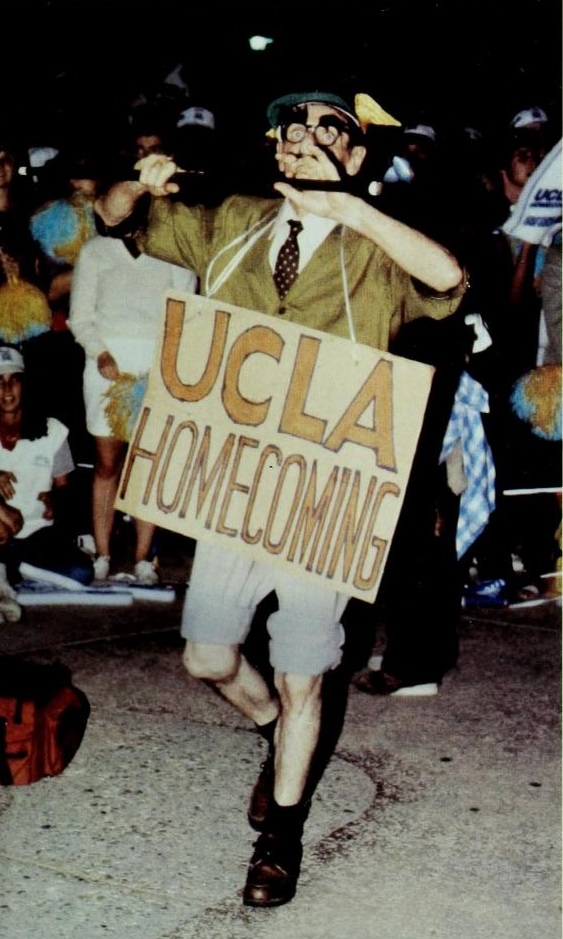
Homecoming Parade
The UCLA Latino Alumni Association (ULAA) was founded in 1989 as a way for Latino alumni to stay connected, get involved and support future generations of Bruins. With a mission to “enrich the lives of Latino alumni and involve them in the exciting future of UCLA,” this dedicated group provides opportunities to stay involved. ULAA’s scholarship program has awarded more than 800 students with over $1.5 million in support since 1991. ULAA was named Network of the Year in 2019.
The UCLA Lambda (LGBTQ) Alumni Association was established by Doug Walters and Corinne Lightweaver in 1989. It is one of the oldest and most well-established LGBTQ alumni organizations in the country. UCLA Lambda sustains a network of LGBTQ+ alumni and friends to support one another, UCLA students, and the greater LGBTQ+ community through social and professional networking, student support and community outreach.
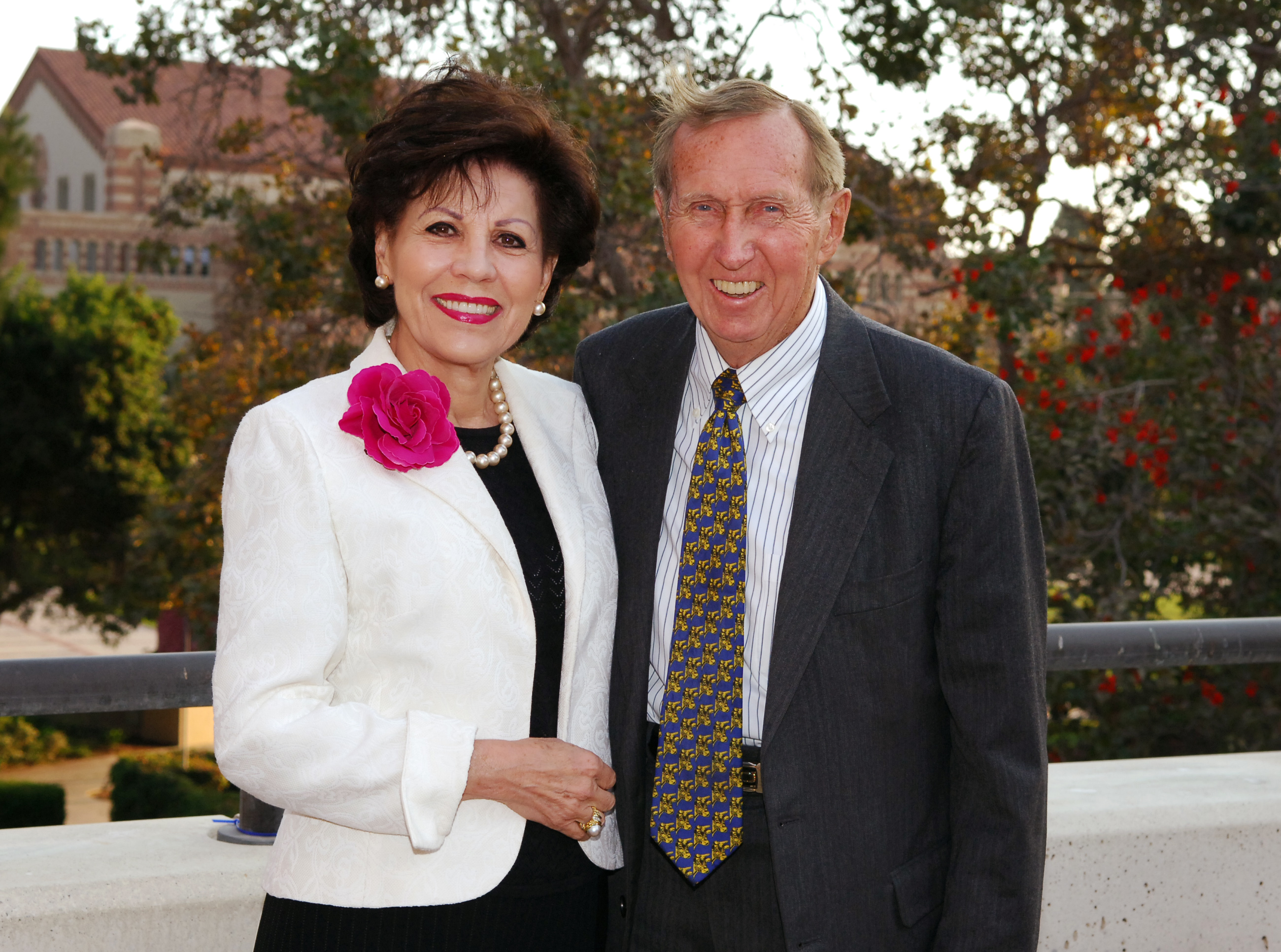
John '40 and Marian Anderson
PERFORMING ARTS ON CAMPUS
UCLA has been committed to music and the arts since its early days on the Vermont campus. By 1960, the College of Fine Arts was home to classes in art, dance, music and theater arts. The programs began separating into distinct departments in the 1980s, with art history and musicology moving to the College of Letters and Science, while design and ethnomusicology remained in Fine Arts. By the late 1980s, the UC Regents formally approved the establishment of the School of the Arts and the School of Theater, Film and Television under founding dean Gilbert Cates. Cates envisioned a professional conservatory environment, expanding the curriculum and strengthening industry connections.
Students faced an expanding technological landscape in the 1980s. Many film students used both video and film, using new technology to take risks and experiment. These students went on to make an impact on the creative landscape, bringing the skills they learned at UCLA to the mainstream.
Critically acclaimed actor, writer and director Tim Robbins ’82 co-founded the Actors’ Gang, the respected Los Angeles theatre ensemble, while still a student. The theater group supports diverse artists as they present unconventional and uncompromising plays.
Students Jonathan Dayton ’80 and Valerie Faris ’80 met at UCLA, where she was studying dance and he directing, and built a company, Bob Industries, making music videos. The pair co-directed the Oscar-winning “Little Miss Sunshine,” about a family road-trip which earned over $100 million at the box office.

Nancy Cartwright '81, the voice of Bart Simpson
TFT Theater alumnus John Rando, M.F.A. ’88, winner of the Tony Award for Best Direction of a Musical for "Urinetown", directed his first musical while still a student at UCLA. He describes UCLA as “an intensive opportunity to direct,” saying, “I directed essentially one production per quarter for two years. It was also really fascinating that they had this amazing pool of talent among the undergraduate students. In fact, when I was going to school, one of the undergraduates was Jack Black, and he was just one among many.”
UCLA students John Ramirez and Stuart Timmons ’81 founded a gay film festival on campus in 1979. Known as the "Gay and Lesbian Media Festival and Conference," the name was changed to Outfest in 1994. A group of graduate students in the UCLA Motion Picture/ Television Studies Program created the UCLA Gay & Lesbian Media Coalition in 1981. The Coalition members organized a conference, hosted by the UCLA Department of Theater Arts, to address the status of gay and lesbian representation in film and television studies.
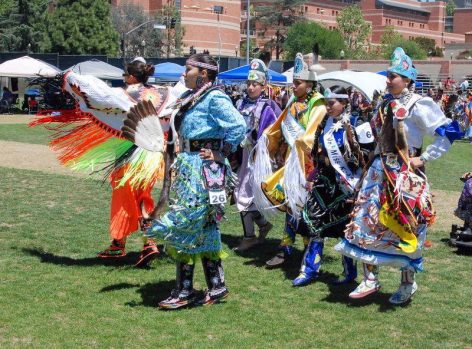
UCLA Pow Wow
A new Bruin tradition began when UCLA students organized the first Pow Wow in 1985. Nearly every spring since, UCLA’s American Indian Student Association hosts a two-day festival to celebrate American Indian Culture. The campus welcomes Native Americans from Southern California and beyond to express themselves in traditional and contemporary dance, songs and social activities.
POLITICS AND ACTIVISM
While there were fewer large protests on campus in the Eighties, students took on more responsibility in student government. Student activism focused on the South African government's apartheid politics, Central American policy and affirmative action.
In 1985, 2,000 protesters boycotted classes and gathered on campus for a rally to demand that the University of California divest funds from companies that did business with South Africa. About two dozen students moved into Murphy Hall. When removed by police, the students, along with 30 faculty members, set up tents in the Schoenberg Quad, calling it Mandela City.
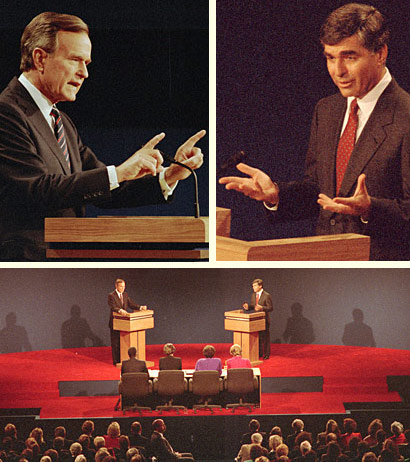
Bush vs. Dukakis Presidential Debate in Pauley Pavillion
Michelle King ’84, the 2017 Edward A. Dickson Alumnus of the Year, was superintendent of Los Angeles Unified School District schools, the second-largest district in the nation. A leader in education, King led reforms to increase graduation rates, particularly among traditionally under-represented populations, and championed Restorative Justice programs.
UCLA law professor Eugene Volokh ’83, J.D. ’92, graduated from UCLA with a degree in math-computer science at age 15 after starting his own software company. The professor of First Amendment law clerked for Supreme Court Justice Sandra Day O'Connor, and his law review articles have been cited by opinions in eight Supreme Court cases. Volokh specializes in free speech, religious freedom, gun control and gun rights, cyberspace law, and copyright law.
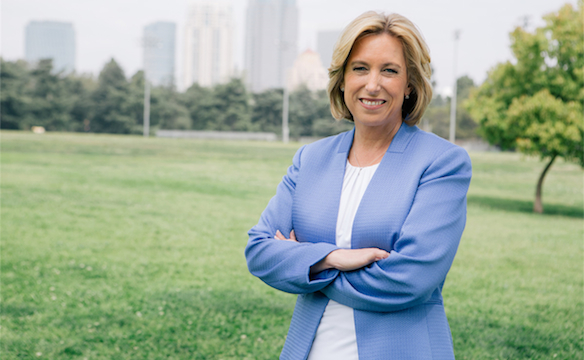
Wendy Greuel '83
ADVANCES IN MEDICINE
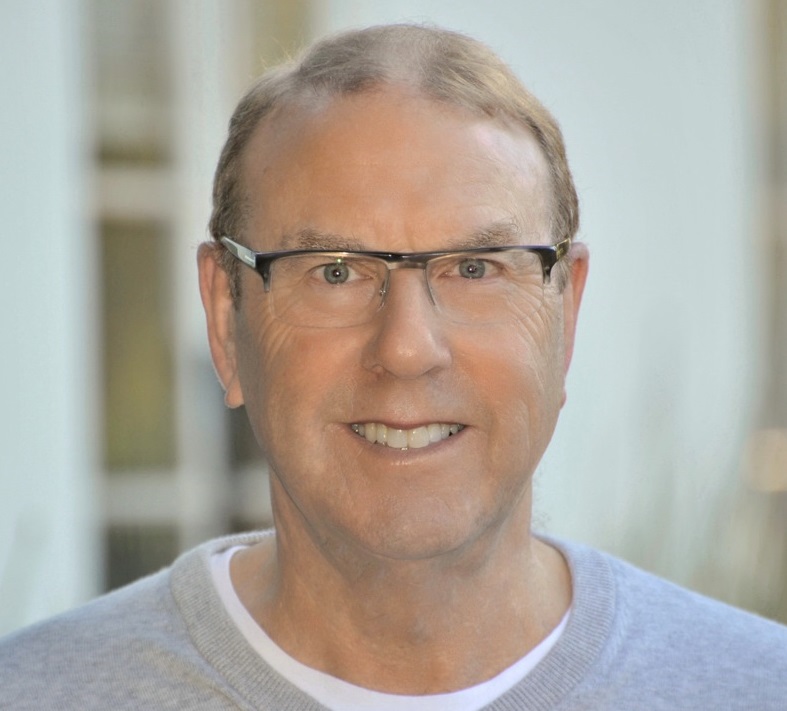
Michael Gottlieb, AIDS Pioneer
Major breakthroughs in chemotherapy treatments came from the discovery by faculty member Owen Witte of protein activity in leukemia in 1983. These advances led to the development of the targeted chemotherapy treatment, Gleevec. Witte went on to become the founding director of the Broad Stem Cell Research Center bringing research discoveries from laboratory to patient.
UCLA doctors became the first in the western United States to remove kidney stones without surgery. The procedure, lithotripsy, sits patients in water baths as shock waves break up the stones.
The Heart Transplant Program was founded in 1984, now one of the largest such programs in the world, with more than 2,000 transplants. Dr. Hillel Laks founded the program, the lung and heart-lung program in 1986 and the alternate heart program in 1992, pairing patients not normally considered for transplant with hearts that would otherwise not be used.
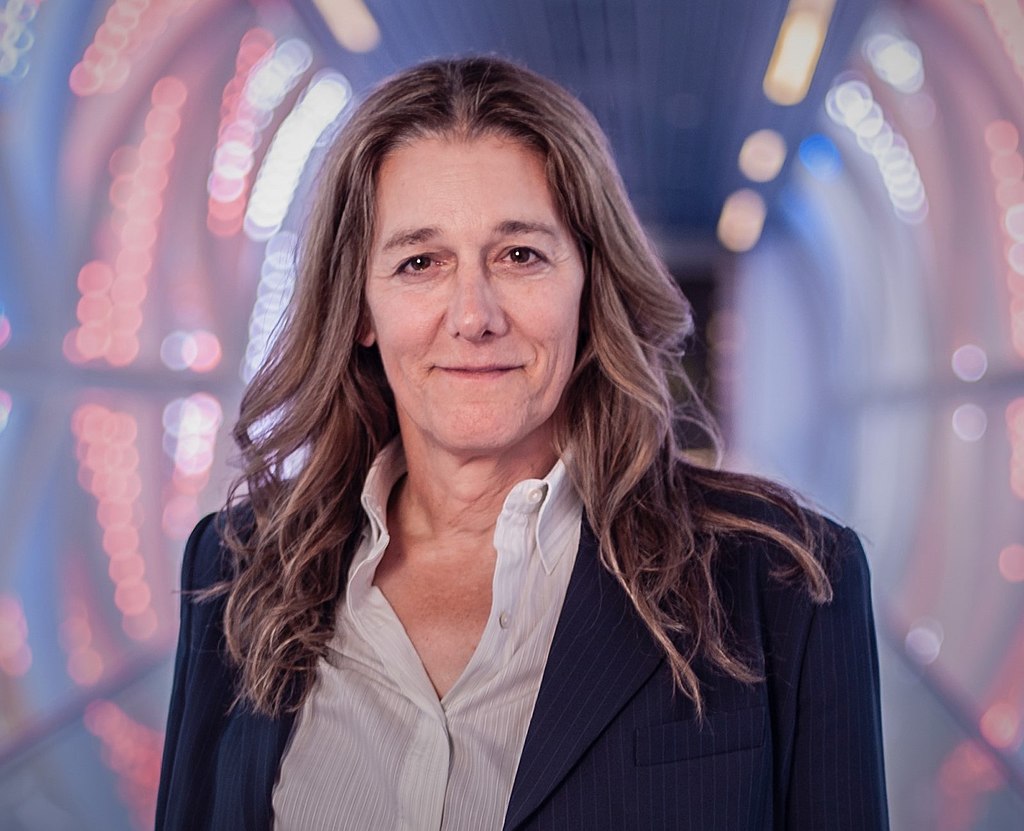
Martine Rothblatt ’77, M.B.A. ’81, J.D. ’81
SCIENCE AT THE FOREFRONT
Professor of biological chemistry Michael Grunstein proved details about histones, a key element in gene regulation in 1988. The study of histones founded on Grunstein and his team's research is helping to understand the biology of disease. Colleague Dr. Kelsey Martin, dean of the Geffen School of Medicine, says, “His pioneering work fundamentally changed our understanding of one of the most basic aspects of biology...and opened the door for new therapeutic approaches to disease.”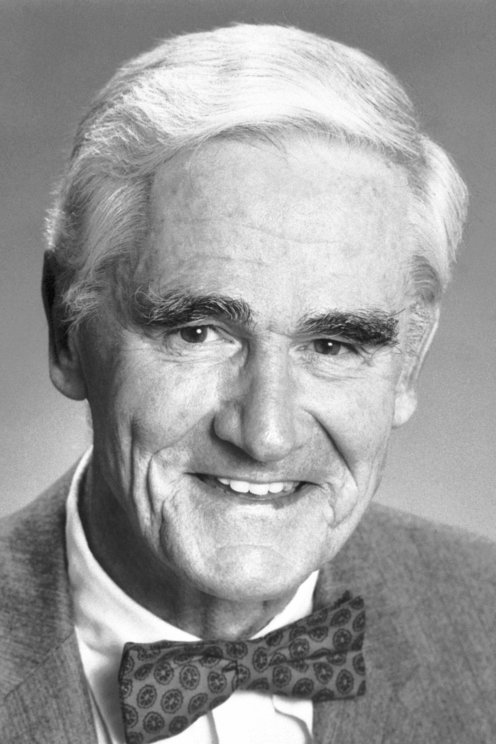
Nobel Laureate Donald Cram
In 1988, professor and computer scientist Leonard Kleinrock, who contributed to the foundation of computer networking, chaired a group that produced the report “Toward a National Research Network.” These findings led to the development of a national networking infrastructure when they were presented to Congress and used by Senator Al Gore as the foundation for the High Performance Computing and Communication Act of 1991.
HALL OF FAMERS AND A NEW HOME
For the 1982 football season, the Bruins football team faced the loss of their home stadium. UCLA, and local rival USC, had called the Los Angeles Coliseum home since the 1920s, sharing it with NFL’s Los Angeles Rams from 1946 to 1979. Following negotiations with the Oakland Raiders and their impending move to Los Angeles, Chancellor Charles E. Young, M.A. ’57, Ph.D. ’60, began negotiations with Pasadena to relocate UCLA’s home games to the Rose Bowl.
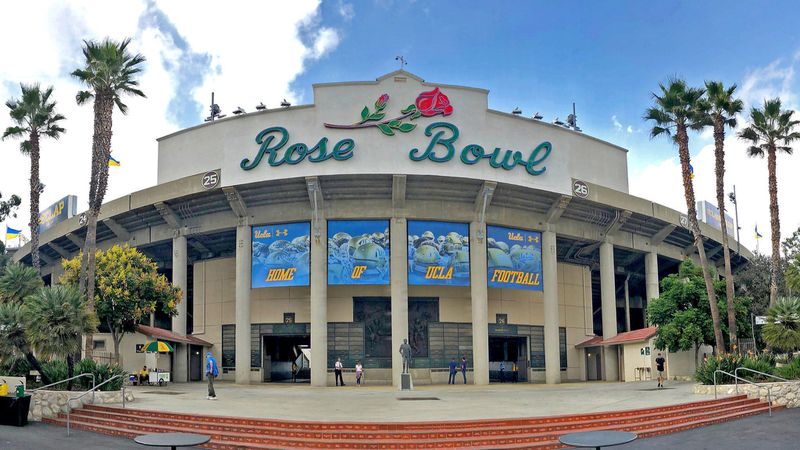
Rose Bowl - Home of UCLA Football
All-American Troy Aikman ’08 led UCLA to a 20-4 record during his career, and was the first UCLA player to win the Davey O’Brien Award as the nation’s top quarterback. In the NFL Aikman won three Super Bowls and was elected to the Hall of Fame. A successful sportscaster, Aikman returned to UCLA in 2008 to complete his degree in sociology.
Other UCLA sports thrived during the 1980s. Longtime head coach of the UCLA Women’s Gymnastics team Valorie Kondos Field ’87 is known for her passion for excellence and ability to connect with people. The UCLA Hall of Fame coach was a friend of legendary Bruin coach John Wooden. Named Pac-12 Coach of the Century and known by her student-athletes as “Miss Val,” she retired in 2019 with six NCAA team championships. Reggie Miller helped the Bruins win their only National Invitation Tournament Championship (NIT) in 1985. Known as one of basketball’s best three-point shooters, in his final year at UCLA the three-point field goal was instituted in college basketball. Miller’s jersey was retired by the Bruins in 2013, and hangs in the rafters of Pauley Pavilion.
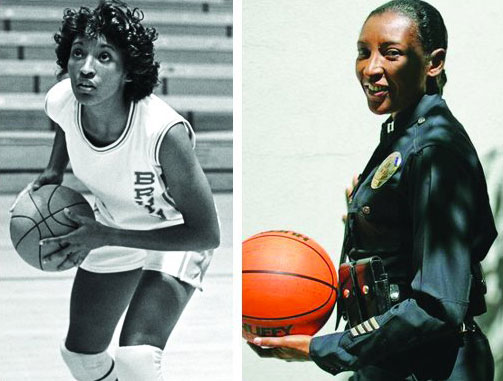
Anita Ortega '82
MIGHTY BRUINS
In 1984, to commemorate their 50th anniversary, the Alumni Association unveiled two gifts to campus. The iconic bronze statue known as The Bruin was given a permanent home on Bruin Plaza and has become a campus gathering spot, photo location and landmark. The ferocious looking grizzly, unlike friendly Joe Bruin, was designed to be “formidable,” according to Alumni Association founding member Alexander Hamilton ’24. At 10 feet long, six feet tall and weighing more than two tons, it is believed to be the largest bear statue in the United States. Created by artist Billy Fitzgerald, the giant figure symbolizes the strength and progress of UCLA.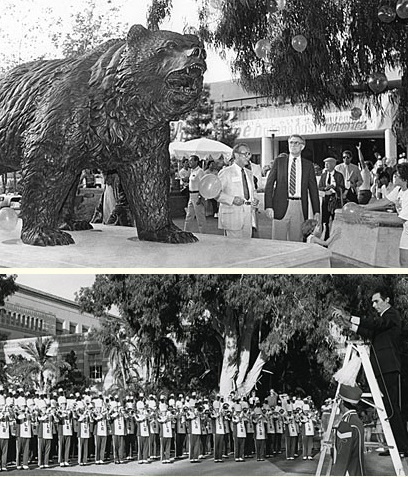
UCLA Bruin statue unveiled; Bill Conti leads the UCLA Band in the performance of “The Mighty Bruins
In the next decade, UCLA would be rocked by the Northridge quake, the L.A. Riots, the retirement of Chancellor Young and protests over the expansion of the Chicano Studies Center, and Propositions 187 and 209. And in one shining moment, UCLA celebrated another NCAA Basketball National Championship, continuing a proud legacy of Bruin excellence.
Series Archive